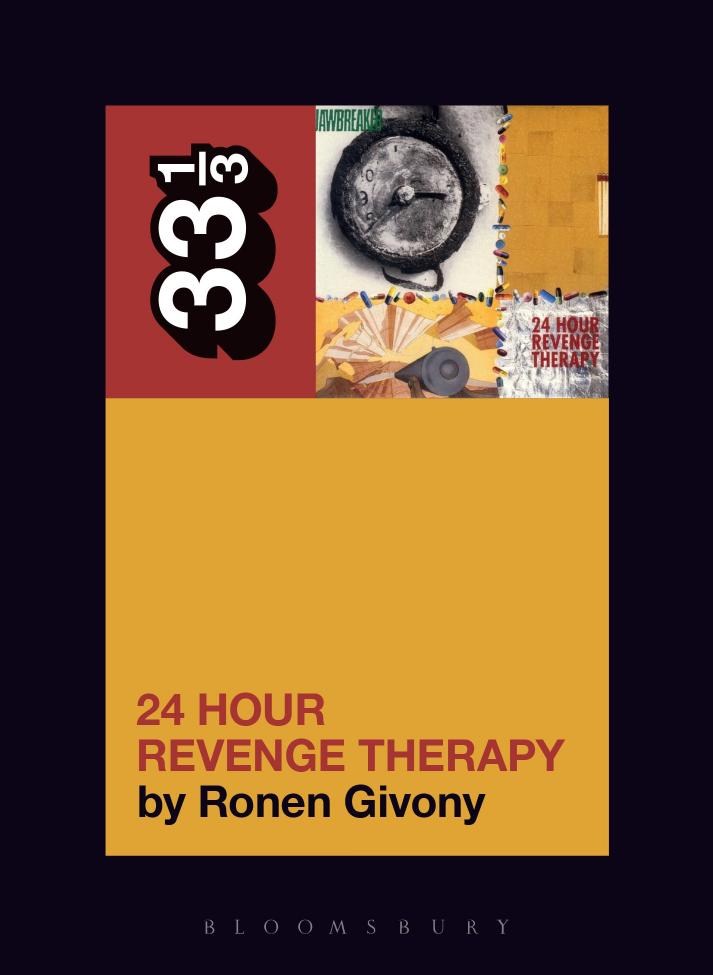Jawbreaker's 24 Hour Revenge Therapy by Ronen Givony

Author:Ronen Givony
Language: eng
Format: epub, pdf
Publisher: Bloomsbury USA
Selling kids to other kids
24 Hour Revenge Therapy came out in stores on February 15, 1994, on Tupelo/Communion Records, nine months to the day Jawbreaker set out in their van from San Francisco to record with Steve Albini. Blake: “When our album came out, it was just a relief. It was a real slow burn, but people who knew us liked it pretty immediately and felt like it was a genuine portrait of our band. That was satisfying and I got real good feedback from just people I knew, like real fans of the band.”1
As with Bivouac and Unfun, the band would spend most of the next year touring in support of the new album. This time around, though—depending on your outlook—their timing was either utterly perfect, or uniquely disastrous. Two weeks prior to the release date, another Bay Area trio’s album had also come out: it had a cover illustration by local artist Richie Bucher, and the scatological title of Dookie, by Green Day. Coincidentally, it was also 38 minutes long, the exact length as 24 Hour—but that’s where the similarities end. Dookie would go on to sell a staggering ten million copies in the United States alone, and twenty million total worldwide—just behind Purple Rain and Michael Jackson’s Off the Wall, all-time. As Dan Ozzi wrote: “Let that sink in for a second. An album named after a pile of shit sold roughly as many as an Academy Award-winning Prince soundtrack.”2
No one could have known it then, but Dookie would become the Bay Area’s Nevermind—the album by which every other local band was henceforth measured, and a line in the sand. In its sheer ubiquity and magnitude, Dookie was a landmark album, but also a landmark moment in youth culture, and the mainstreaming of punk, which inevitably triggered its own wave of major-label piranhas and overnight imitators. Before Dookie, a band like Jawbreaker would have existed in relative obscurity: an active, self-sustaining, if largely underground, phenomenon. After Dookie, and the mass audience won over to its poppy, accessible take on punk, there commenced a full-on major-label stampede, identical to the ones that followed the Ramones, Sex Pistols, and Nirvana.
Howie Klein, former president of Reprise Records: “When the record companies saw Green Day break, so gigantically and so fast, all of the record companies thought, ‘Well, we can do that. All these punk bands are the same anyway. My kid has a friend who’s in a punk band. I could get them and they’ll be our Green Day.’ Some record executives honestly thought Green Day was the first punk band.”3
“They sold ten million records their first major-label release—their first shot at a major label,” said Gilman bouncer and artist Jerme Spew. “Nobody knew. They didn’t even know. When they hit a million records, I remember hearing how Billie Joe was like, ‘A million? Who in the hell is buying this shit?’”4
It is entirely possible that there were bigger or more unjust casualties of the post-Dookie stampede than the three members of Jawbreaker, but I’m not aware of them.
Download
Jawbreaker's 24 Hour Revenge Therapy by Ronen Givony.pdf
This site does not store any files on its server. We only index and link to content provided by other sites. Please contact the content providers to delete copyright contents if any and email us, we'll remove relevant links or contents immediately.
| Biographies | Business |
| History & Criticism | Instruments |
| Musical Genres | Recording & Sound |
| Reference | Songbooks |
| Theory, Composition & Performance |
The Goal (Off-Campus #4) by Elle Kennedy(13657)
Kathy Andrews Collection by Kathy Andrews(11812)
Diary of a Player by Brad Paisley(7559)
Assassin’s Fate by Robin Hobb(6199)
What Does This Button Do? by Bruce Dickinson(6195)
Big Little Lies by Liane Moriarty(5790)
Altered Sensations by David Pantalony(5093)
Pale Blue Dot by Carl Sagan(4996)
Sticky Fingers by Joe Hagan(4188)
The Death of the Heart by Elizabeth Bowen(3610)
The Heroin Diaries by Nikki Sixx(3543)
Confessions of a Video Vixen by Karrine Steffans(3301)
Beneath These Shadows by Meghan March(3300)
How Music Works by David Byrne(3259)
The Help by Kathryn Stockett(3139)
Jam by Jam (epub)(3073)
Harry Potter 4 - Harry Potter and The Goblet of Fire by J.K.Rowling(3060)
Computational Linguistics and Intelligent Text Processing: 20th International Conference, CICLing 2019 La Rochelle, France, April 7â13, 2019 Revised Selected Papers, Part I by Alexander Gelbukh(2983)
Strange Fascination: David Bowie: The Definitive Story by David Buckley(2861)
